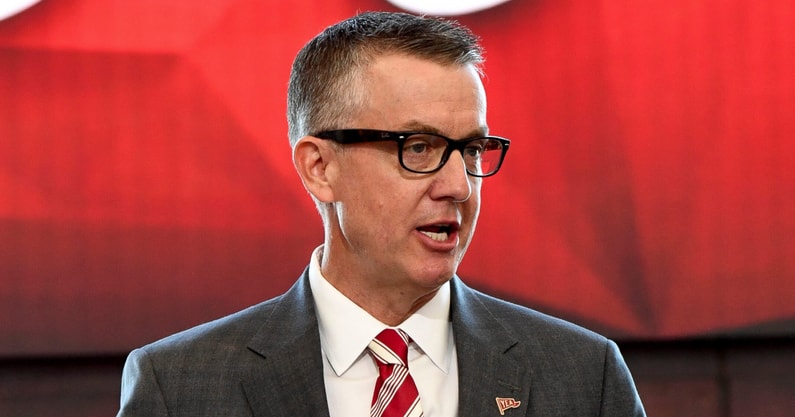Greg Byrne highlights purpose of College Sports Commission, value of addition

Since Friday night’s approval of the transformative House v. NCAA settlement formally ushered revenue-sharing across college athletics, there’s been plenty of confusion around how that process will ultimately be implemented. Even among college power brokers, especially those outside the Power conferences.
That’s where the new College Sports Commission and its newly-appointed CEO Bryan Seeley come into play. The College Sports Commission is the new independent enforcement arm that will implement the settlement’s terms and regulate revenue-sharing, third-party NIL deals and roster limits. The Commission will also regulate rules and investigate any potential violations, participate in an arbitration process once violations are discovered by the new NIL Go clearinghouse from Deloitte, and dole out any necessary punishments from an array of predetermined penalites.
Alabama athletic director Greg Byrne provided key insight into the benefits of the new College Sports Commission during an appearance on Tuesday’s episode of McElroy and Cubelic in the Morning with Birmingham, Ala.-based co-hosts Greg McElroy and Cole Cubelic.
“Nothing lasts long-term that doesn’t have some type of regulation, and the steps that have been taken by the House settlement gives an opportunity for us to have a regulated market,” Byrne said Tuesday. “The College Sports Commission is going to be overseeing that, and basically any NIL deal for a young man or young woman that’s over $600 is going to have to go through the (NIL Go) clearinghouse that Deloitte put together.
“They have a formula that basically will say ‘yeah, this thing passes the smell test or no, this thing doesn’t.’ The formula is not going to be released because everybody will try to figure out how to get around it if it’s released,” Byrne continued. “So young men and young women that have legitimate opportunities for name, image and likeness deals will be able to submit those, and if they pass – and private donations ones are going to struggle on that side – but legitimate business opportunities will be OK. Now you’re not going to get a half-million dollars for showing up at an ice cream shop and putting it out on Instagram anymore.”
Top 10
- 1New
AP Poll Prediction
Shakeup on deck for Top 25
- 2Trending
Nico Iamaleava
QB leaves game after helmet hit
- 3
CFB Top 10
Oregon rises after Week 13
- 4Hot
Dan Lanning call out
Oregon HC rips SEC
- 5
Arch Manning
Texas QB makes history
Get the Daily On3 Newsletter in your inbox every morning
By clicking "Subscribe to Newsletter", I agree to On3's Privacy Notice, Terms, and use of my personal information described therein.
Greg Byrne on College Sports Commission: ‘It’s not perfect, but it’s a heck of a lot better than where we were’
Along with regulating NIL deals, the CSC will help schools properly implement revenue-sharing. Beginning July 1, Power conference schools — and non-Power conference programs that opted into the settlement by Sunday — will be able to share as much as $20.5 million with athletes, with football expected to receive approximately 75%, followed by men’s basketball (15%), women’s basketball (5%) and the remainder of sports (5%). The amount shared in revenue will increase annually.
Power Four football programs are expected to have an additional $13-16 million to spend on rosters beginning with the 2025 season. Many schools have front-loaded contracts ahead of the settlement’s approval, allowing them to skirt the new rules and take advantage of contracts were not vetted by the newly-formed Deloitte clearinghouse NIL Go.
While there has been some detractors of the new College Sports Commission, especially given some uncertainty with the still-yet-to-be-finalized details regarding how it will implement the new rules, Byrne is confident it’s the best available solution to all that’s been ailing college athletics in the day-and-age of NIL and the NCAA Transfer Portal.
“From listening to football coaches in the SEC, my peers at the other SEC institutions, there is a real desire to make this work,” Byrne added. “And there is arbitration on things that we wouldn’t be able to arbitrate before, so that’ll give both sides an opportunity to be heard when there are challenges that arise. It’s not perfect, but it’s a heck of a lot better than where we were.”
— On3’s Pete Nakos contributed to this report.